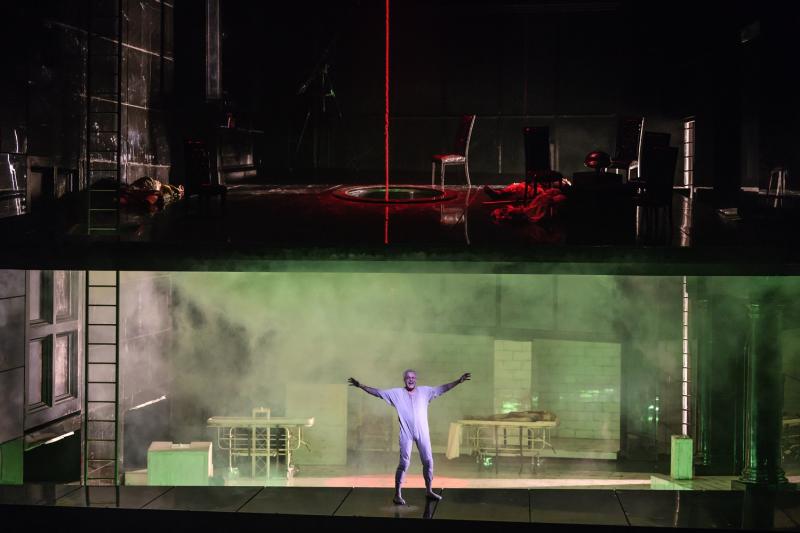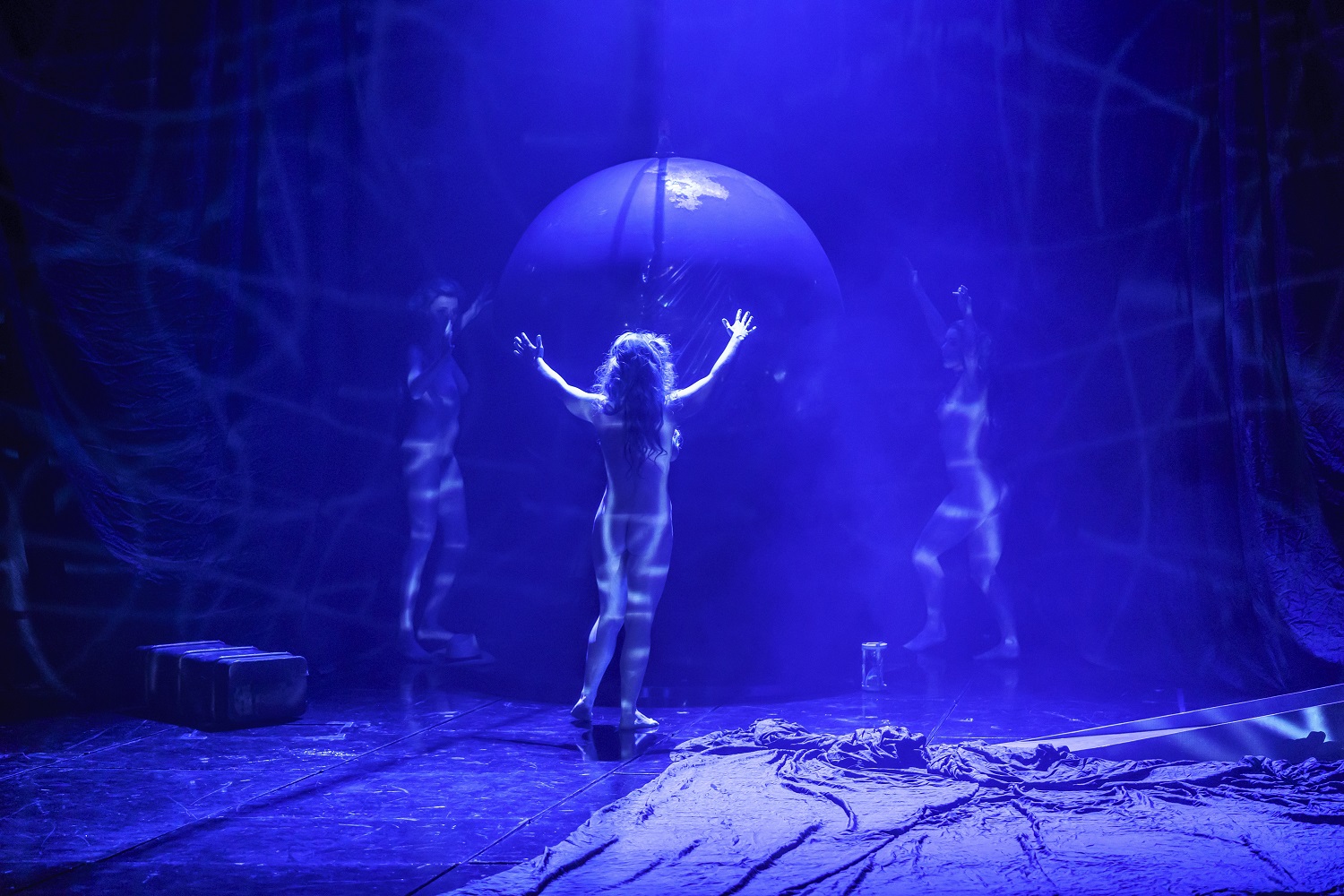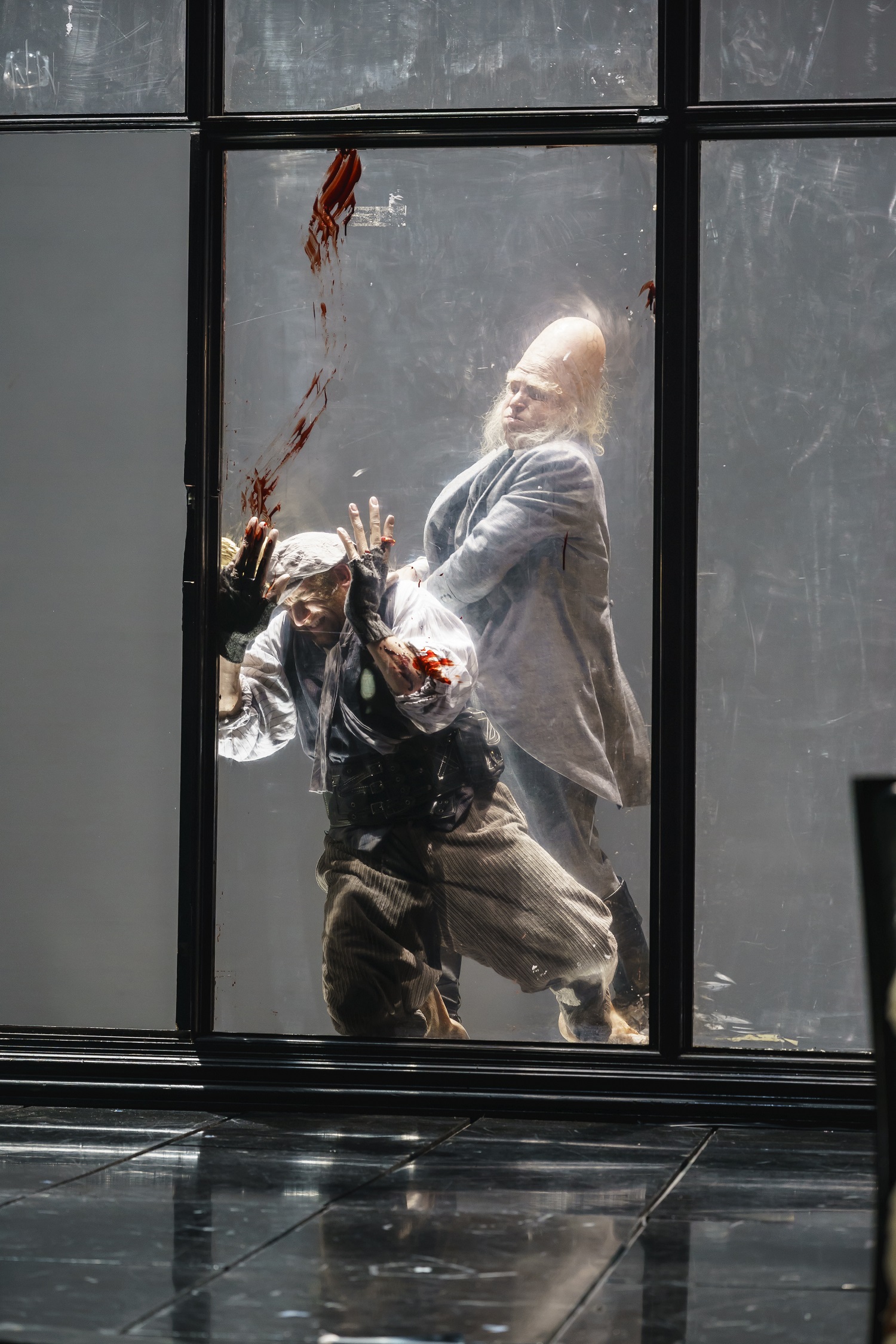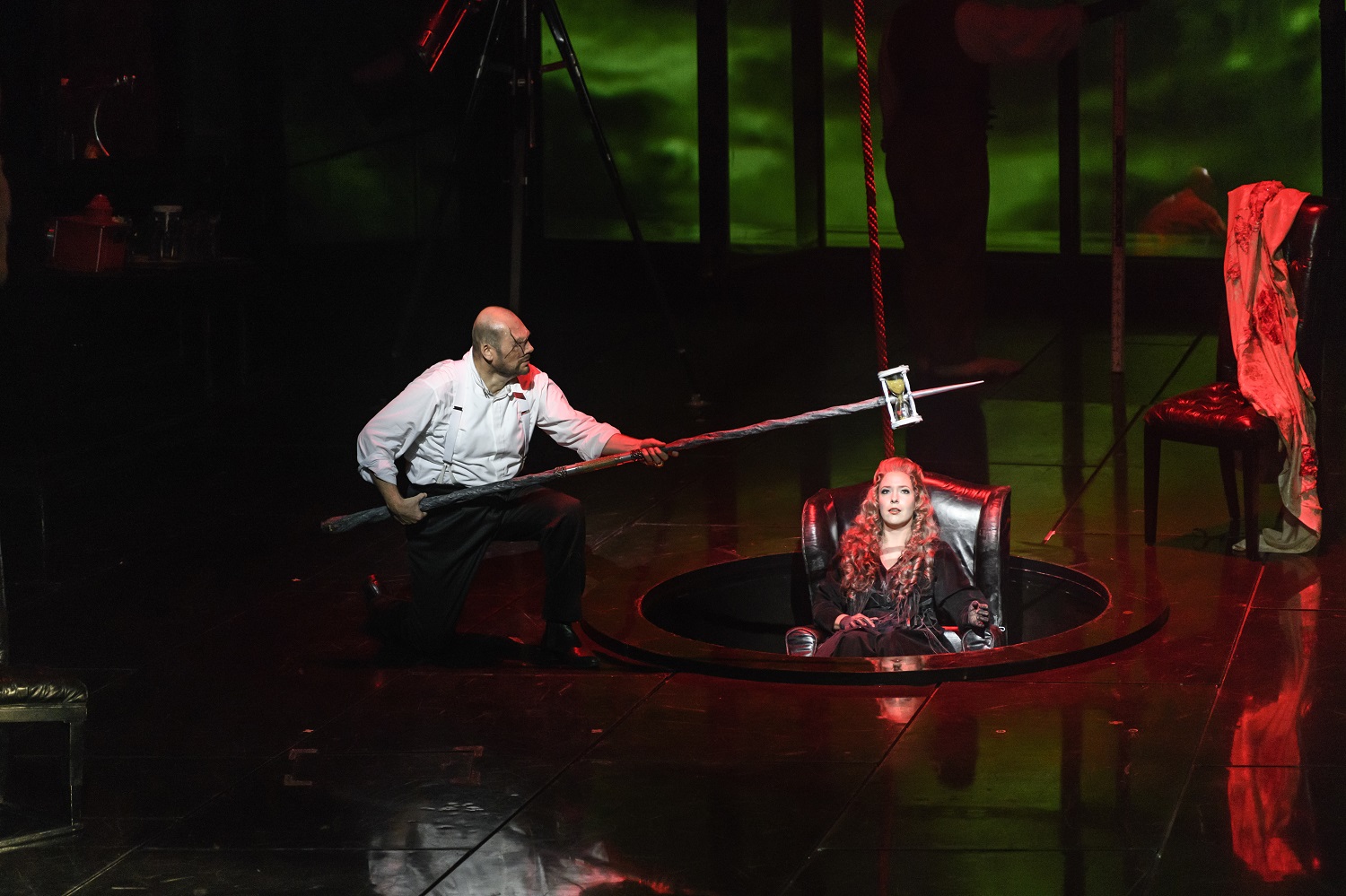Das Rheingold, Royal Opera review - high drama and dark comedy | reviews, news & interviews
Das Rheingold, Royal Opera review - high drama and dark comedy
Das Rheingold, Royal Opera review - high drama and dark comedy
Strong casting and dynamic staging augur well for Covent Garden’s latest Ring revival

Keith Warner’s production of Wagner's Der Ring des Nibelungen was first seen at Covent Garden between 2004 and 2006, and is now back for a third and final series of full runs, chiefly to catch the Brünnhilde of Nina Stemme in three of the operas, continuing into November.
For the opening scene, the depths of the Rhine are represented by snaky lines projected on a black backdrop. This is the only scene that felt dated, a futuristic virtual reality world, as imagined in an earlier time. Thankfully, the three Rhinemaidens, Lauren Fagan, Christina Bock and Angela Simkin (pictured below), got the singing off to an excellent start, the three voices buoyant and fresh, and blending beautifully.  The appearance of Johannes Martin Kränzle as Alberich set the tone for the drama to come. This Alberich is as comical and inept as he is malign, constantly active, often sarcastic, and usually verging on maniacal. Kränzle gave the finest performance in the show. He is a magnetic stage presence, and totally believable in every situation: whether crudely flirting with Rhinemaidens here, acting the mad professor in the Nibelheim scene, or the simpering hostage later on, it is all utterly convincing. Add to that a powerful but infinitely flexible and varied baritone voice, and you’ve got the whole package – one of the great Wagnerians of our times.
The appearance of Johannes Martin Kränzle as Alberich set the tone for the drama to come. This Alberich is as comical and inept as he is malign, constantly active, often sarcastic, and usually verging on maniacal. Kränzle gave the finest performance in the show. He is a magnetic stage presence, and totally believable in every situation: whether crudely flirting with Rhinemaidens here, acting the mad professor in the Nibelheim scene, or the simpering hostage later on, it is all utterly convincing. Add to that a powerful but infinitely flexible and varied baritone voice, and you’ve got the whole package – one of the great Wagnerians of our times.
The second scene reveals the gods to be decadent aristocrats in a dilapidated mansion. The look here is faded Victorian with a hint of steam punk. The only weak link in this cast is John Lundgren as Wotan. Vocally, he was insecure, often verging on inaudible, though some of his more dramatic monologues came off better. But dramatically, too, he doesn’t command the stage or hold the attention. Much better is Alan Oke as Loge. The production makes much of Loge’s machinations, and Oke, a seasoned character singer, puts in an excellent performance, nimble, but also darkly manipulative.
 Froh and Donner are played for comedy by Andrew Staples and Markus Eiche, grown children of the family but acting like adolescents. It’s another of Warner’s black comedy touches and it just about works. Sarah Connolly may be the only cast member here to have appeared in previous stagings of this production, and her Fircka is solid and dependable. Lise Davidsen stands out as Freia. She has a sweet-toned and effortlessly powerful voice, ideal for this role. Excellent giants too, Günther Groissböck as Fasolt and Brindley Sherratt as Fafner (pictured left), seasoned Wagnerians, and both on fine form.
Froh and Donner are played for comedy by Andrew Staples and Markus Eiche, grown children of the family but acting like adolescents. It’s another of Warner’s black comedy touches and it just about works. Sarah Connolly may be the only cast member here to have appeared in previous stagings of this production, and her Fircka is solid and dependable. Lise Davidsen stands out as Freia. She has a sweet-toned and effortlessly powerful voice, ideal for this role. Excellent giants too, Günther Groissböck as Fasolt and Brindley Sherratt as Fafner (pictured left), seasoned Wagnerians, and both on fine form.
For Alberich's Nibelheim, the floor rises to reveal the subterranean lair, a memorable piece of stagecraft. Nibelheim itself is a kind of morgue-cum-laboratory, with the Nibelung slaves being created as zombies. The transformations with the Tarnhelm, with Alberich transforming himself into a giant and then a toad, are very convincing, with a great King Kong pastiche from the giant. Gerhard Siegel is suitably frenetic and cowering as Mime, but the scene belongs to Kränzle and Oke.
Back on the mountain top, there is a final excellent voice to add to the lineup, Wiebke Lehmkuhl as Erda (pictured below with Lundren). Her alto is rich and complex but also smooth and seductive. Excellent support and projection, too – a commanding performance. In the pit, Antonio Pappano leads a dramatic and flowing performance, as engaged as ever with his singers and players, but also more sympathetic to the style of the music than in earlier runs of this production. The continuity of the drama is his top priority, so he won’t slow significantly, for example, at the Giants’ entrance, nor dwell on the orchestral drama of the scene changes. Orchestral balances are unusual. The six harps are all in the pit, and mostly inaudible, while the timpani and percussion are in a box stage left, dominating proceedings. But the orchestral playing is excellent throughout, especially from the brass, who produce warm, elegant harmonies even at the most extreme dynamics.
In the pit, Antonio Pappano leads a dramatic and flowing performance, as engaged as ever with his singers and players, but also more sympathetic to the style of the music than in earlier runs of this production. The continuity of the drama is his top priority, so he won’t slow significantly, for example, at the Giants’ entrance, nor dwell on the orchestral drama of the scene changes. Orchestral balances are unusual. The six harps are all in the pit, and mostly inaudible, while the timpani and percussion are in a box stage left, dominating proceedings. But the orchestral playing is excellent throughout, especially from the brass, who produce warm, elegant harmonies even at the most extreme dynamics.
This Ring cycle gets off to a promising start here, with a fine ensemble performance of Rheingold. Johannes Martin Kränzle is undoubtedly the star, but the casting is considerably enriched by the many fine voices in the smaller roles, particularly the Rhinemaidens, Giants, Freia and Erda. Kränzle's Alberich will be back for Siegfried and Götterdämmerung, although, as of Wednesday, when they reach Die Walküre, the entire cycle is likely to be dominated by Stemme's incomparable Brünnhilde.
- Der Ring des Nibelungen continues at Royal Opera on Wednesday 26 September. The cycle is being recorded for future broadcast on BBC Radio 3.
- Read more opera reviews on theartsdesk
rating
Explore topics
Share this article
The future of Arts Journalism
You can stop theartsdesk.com closing!
We urgently need financing to survive. Our fundraising drive has thus far raised £49,000 but we need to reach £100,000 or we will be forced to close. Please contribute here: https://gofund.me/c3f6033d
And if you can forward this information to anyone who might assist, we’d be grateful.

Subscribe to theartsdesk.com
Thank you for continuing to read our work on theartsdesk.com. For unlimited access to every article in its entirety, including our archive of more than 15,000 pieces, we're asking for £5 per month or £40 per year. We feel it's a very good deal, and hope you do too.
To take a subscription now simply click here.
And if you're looking for that extra gift for a friend or family member, why not treat them to a theartsdesk.com gift subscription?
more Opera
 Tosca, Welsh National Opera review - a great company reduced to brilliance
The old warhorse made special by the basics
Tosca, Welsh National Opera review - a great company reduced to brilliance
The old warhorse made special by the basics
 BBC Proms: The Marriage of Figaro, Glyndebourne Festival review - merriment and menace
Strong Proms transfer for a robust and affecting show
BBC Proms: The Marriage of Figaro, Glyndebourne Festival review - merriment and menace
Strong Proms transfer for a robust and affecting show
 BBC Proms: Suor Angelica, LSO, Pappano review - earthly passion, heavenly grief
A Sister to remember blesses Puccini's convent tragedy
BBC Proms: Suor Angelica, LSO, Pappano review - earthly passion, heavenly grief
A Sister to remember blesses Puccini's convent tragedy
 Orpheus and Eurydice, Opera Queensland/SCO, Edinburgh International Festival 2025 review - dazzling, but distracting
Eye-popping acrobatics don’t always assist in Gluck’s quest for operatic truth
Orpheus and Eurydice, Opera Queensland/SCO, Edinburgh International Festival 2025 review - dazzling, but distracting
Eye-popping acrobatics don’t always assist in Gluck’s quest for operatic truth
 MARS, Irish National Opera review - silly space oddity with fun stretches
Cast, orchestra and production give Jennifer Walshe’s bold collage their all
MARS, Irish National Opera review - silly space oddity with fun stretches
Cast, orchestra and production give Jennifer Walshe’s bold collage their all
 Káťa Kabanová, Glyndebourne review - emotional concentration in a salle modulable
Janáček superbly done through or in spite of the symbolism
Káťa Kabanová, Glyndebourne review - emotional concentration in a salle modulable
Janáček superbly done through or in spite of the symbolism
 Buxton International Festival 2025 review - a lavish offering of smaller-scale work
Allison Cook stands out in a fascinating integrated double bill of Bernstein and Poulenc
Buxton International Festival 2025 review - a lavish offering of smaller-scale work
Allison Cook stands out in a fascinating integrated double bill of Bernstein and Poulenc
 Tosca, Clonter Opera review - beauty and integrity in miniature
Happy surprises and a convincing interpretation of Puccini for today
Tosca, Clonter Opera review - beauty and integrity in miniature
Happy surprises and a convincing interpretation of Puccini for today
 Hamlet, Buxton International Festival review - how to re-imagine re-imagined Shakespeare
Music comes first in very 19th century, very Romantic, very French operatic creation
Hamlet, Buxton International Festival review - how to re-imagine re-imagined Shakespeare
Music comes first in very 19th century, very Romantic, very French operatic creation
 Falstaff, Glyndebourne review - knockabout and nostalgia in postwar Windsor
A fat knight to remember, and snappy stagecraft, overcome some tedious waits
Falstaff, Glyndebourne review - knockabout and nostalgia in postwar Windsor
A fat knight to remember, and snappy stagecraft, overcome some tedious waits
 Salome, LSO, Pappano, Barbican review - a partnership in a million
Asmik Grigorian is vocal perfection in league with a great conductor and orchestra
Salome, LSO, Pappano, Barbican review - a partnership in a million
Asmik Grigorian is vocal perfection in league with a great conductor and orchestra
 Semele, Royal Opera review - unholy smoke
Style comes and goes in a justifiably dark treatment of Handelian myth
Semele, Royal Opera review - unholy smoke
Style comes and goes in a justifiably dark treatment of Handelian myth
